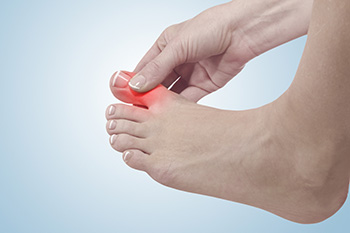(517) 487-5171
Fax (517) 908-0172
Gout Symptoms and the Importance of Early Treatment
Tuesday, 11 February 2025 00:00
Gout is a form of arthritis that causes sudden and severe pain in the joints, frequently the big toe. The symptoms typically include redness, swelling, and intense pain that may last for hours or days. If left untreated, gout can lead to recurring flare-ups and long-term joint damage. Early treatment is vital in managing gout and preventing complications, such as joint deformities or kidney stones. Addressing the condition early with medication and lifestyle changes can reduce inflammation and pain, and help maintain joint function. Several risk factors contribute to the development of gout, including obesity, a diet high in purine-rich foods like red meat and seafood, excessive alcohol consumption, and family history. Additionally, conditions such as high blood pressure and diabetes can increase the likelihood of developing gout. If you have symptoms of gout, it is suggested that you are under the care of a podiatrist who can properly diagnose and help you to manage this painful condition.
Gout is a painful condition that can be treated. If you are seeking treatment, contact Dr. Gary Cesar from Michigan Foot and Ankle Center. Our doctor will treat your foot and ankle needs.
What Is Gout?
Gout is a form of arthritis that is characterized by sudden, severe attacks of pain, redness, and tenderness in the joints. The condition usually affects the joint at the base of the big toe. A gout attack can occur at any random time, such as the middle of the night while you are asleep.
Symptoms
- Intense Joint Pain - Usually around the large joint of your big toe, and it most severe within the first four to twelve hours
- Lingering Discomfort - Joint discomfort may last from a few days to a few weeks
- Inflammation and Redness -Affected joints may become swollen, tender, warm and red
- Limited Range of Motion - May experience a decrease in joint mobility
Risk Factors
- Genetics - If family members have gout, you’re more likely to have it
- Medications - Diuretic medications can raise uric acid levels
- Gender/Age - Gout is more common in men until the age of 60. It is believed that estrogen protects women until that point
- Diet - Eating red meat and shellfish increases your risk
- Alcohol - Having more than two alcoholic drinks per day increases your risk
- Obesity - Obese people are at a higher risk for gout
Prior to visiting your podiatrist to receive treatment for gout, there are a few things you should do beforehand. If you have gout you should write down your symptoms--including when they started and how often you experience them, important medical information you may have, and any questions you may have. Writing down these three things will help your podiatrist in assessing your specific situation so that he or she may provide the best route of treatment for you.
If you have any questions, please feel free to contact our offices located in Lansing and Mt. Pleasant, MI . We offer the newest diagnostic and treatment technologies for all your foot care needs.








